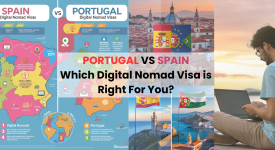Top 5 Countries Launching Digital Nomad Visas in 2025
Alright, let’s dive into something that honestly changed the way I look at work and travel i.e countries launching digital nomad visas. If you’re like me and you’ve ever dreamt of working from a beach in Southeast Asia or a cozy café in Europe, 2025 is shaping up to be a great year. Lots of countries are introducing new digital nomad visas, and I’ve got some incredible news on the top five that are either launching or revamping their programs this year.
I’ll be real with you, from scrambling for paperwork to wondering if I would get deported after 90 days, the old tourist visa shuffle just doesn’t cut it anymore. That’s why these new digital nomad visas are such a game-changer. They’re designed for people who work online, want to stay longer, and actually live somewhere-not just pass through.
More read: Top 10 Countries Offering Digital Nomad Visas in 2025 (With Application Links)
Let’s discuss about the five Countries Launching Digital Nomad Visas
The Philippines: Island Life Meets Remote Work
Okay, this one’s fresh off the press. The Philippines is launching a digital nomad visa that lets you live and work there for up to two years. Imagine trading your dreary office view for white sand beaches and turquoise water. I mean, I’ve spent a month in Manila before, and the vibe is unbeatable-friendly people, affordable food, and internet that’s honestly better than I expected.
What’s the catch? Well, you’ve got to be at least 18, show proof you’re working remotely for a company outside the Philippines, and have a clean criminal record. Oh, and you’ll need health insurance that covers your stay. The government’s pretty strict about making sure you’re not taking jobs from locals, so you can’t work for a Filipino company while you’re there.
One thing I wish I’d known before: you need to be from a country that also offers digital nomad visas to Filipinos, and your country must have a Philippine Foreign Service Post. It’s a bit of a mouthful, but basically, check if your home country is on their list before you get too excited.
Personal tip: If you’re a fan of surfing or diving, this is the place. I spent a week in Siargao and barely got any work done because the waves were calling my name every morning.
Portugal: Europe’s Digital Nomad Darling
Portugal has been on the digital nomad map for a while, but in 2025, they’re making their D8 Visa even more accessible for remote workers. I lived in Lisbon for six months, and honestly, I get why everyone raves about it-affordable living, great coffee, and a community of people who actually get the whole “work-from-anywhere” thing.
The D8 Visa lets you stay for up to a year, and you can renew it if you fall in love with the place (which, trust me, is easy to do). You’ll need to show proof of income from outside Portugal and have health insurance. The process is pretty straightforward, but you do need to be organized with your paperwork.
One thing that tripped me up: Portugal’s bureaucracy can be a bit… slow. I remember waiting weeks for my tax number. Just be patient, and maybe bring a good book for those government office visits.
Why I love it: Fast internet, friendly locals, and you’re a quick train ride from the beach or the mountains. Plus, the pastries? Don’t even get me started.
Spain: Sun, Sangria, and a Serious Work-Life Balance
Spain’s digital nomad visa is a dream for anyone who wants to soak up the Mediterranean sun while working remotely. The visa lets you stay for 12 months, and you can renew it for up to five years. I spent a summer in Barcelona, and honestly, the work-life balance here is next level-siestas are real, and people actually take time to enjoy life.
To qualify, you’ll need to earn at least €2,762 a month, have a clean criminal record, and prove you’ve been working remotely for at least a year. The application process can be a bit of a headache-think lots of paperwork and translations-but if you stick with it, it’s worth it.
A little heads-up: you will have to pay local taxes while you’re living in Spain, but there are some reduced rates for digital nomads. If you’re like me and hate dealing with tax stuff, it’s worth hiring a local accountant to help out.
Italy: La Dolce Vita for Remote Workers
Italy’s new digital nomad visa is finally here, and it’s perfect for anyone who wants to live out their Under the Tuscan Sun fantasy while still getting paid The visa is open to non-EU citizens who work remotely for companies outside Italy. You can stay for a year, and there’s a chance to renew if you’re not ready to say goodbye to gelato and cobblestone streets.
You’ll need to show proof of employment or freelance work, have health insurance, and meet the income requirements. The process is pretty similar to other European countries, but Italy is known for being a bit old-school with paperwork-so double-check everything before you submit.
What surprised me: The cost of living in smaller Italian towns is way lower than in Rome or Milan. I spent a month in Florence and ate like a king for less than I’d spend on groceries back home.
Croatia: Mindblowing Charm Without the Tax Headache
Croatia’s digital nomad visa has been around for a bit, but in 2025, it’s getting a refresh that makes it even more appealing. You can live and work in Croatia for up to a year, and the best part? You don’t have to pay local income tax while you’re there. That’s a huge win if you’re trying to keep more of your hard-earned cash.
To qualify, you need to be a non-EU/EEA citizen, prove you earn around €2,539 a month, and have health insurance. The application is pretty straightforward, and the Croatian government is actually pretty responsive (which, if you’ve dealt with visas before, is a rare treat).
I spent a few weeks in Split, and the digital nomad community there is super welcoming. Plus, the coastline is unreal-think crystal-clear water and ancient Roman ruins around every corner.
Random Tip: I tried learning Croatian to impress the locals, but let’s just say my accent still makes people laugh. They appreciate the effort, though!
Final Thoughts: Picking the Right Country for You
So, which country should you pick? Honestly, it depends on what you’re looking for. If you want island vibes and a low cost of living, the Philippines is unbeatable. If you’re after European culture and don’t mind a bit of bureaucracy, Portugal, Spain, and Italy are all solid bets. And if you want to save on taxes while enjoying some of the best beaches in Europe, Croatia’s your spot.
A couple of things I wish I’d known before jumping into the digital nomad life:
- Always double-check visa requirements-they change all the time.
- Get your paperwork in order before you go. Trust me, it saves a lot of stress.
- Join local digital nomad groups on social media. They’re a goldmine for tips, housing leads, and new friends.
And hey, don’t stress if things don’t go perfectly. I’ve missed flights, lost documents, and gotten lost more times than I can count. But every mistake is a story-and honestly, that’s half the fun.
If you’re thinking about making a change, 2025 is your year. The world is opening up in new ways for remote workers, and these five countries are leading the charge. So pack your laptop, grab your passport, and get ready for an digital nomad adventure. You won’t regret it, mark my words!
Quick Recap Table
| Country | Visa Length | Tax Benefits | Key Requirement | Vibe |
|---|---|---|---|---|
| Philippines | Up to 2 yrs | Standard | Remote work, outside income | Tropical, laid-back |
| Portugal | 1 yr (renew) | Standard | Non-EU, remote work | European, friendly |
| Spain | 1 yr (renew up to 5) | Must pay local tax | €2,762/month income | Sunny, vibrant cities |
| Italy | 1 yr (renew) | Standard | Non-EU, remote work | Cultural, picturesque |
| Croatia | 1 yr | No local tax | €2,539/month income | Coastal, affordable |
If you’ve got questions or want to share your own nomad stories, drop them below. I love hearing from fellow travellers-especially if you’ve got tips on where to find the best WiFi and coffee.








